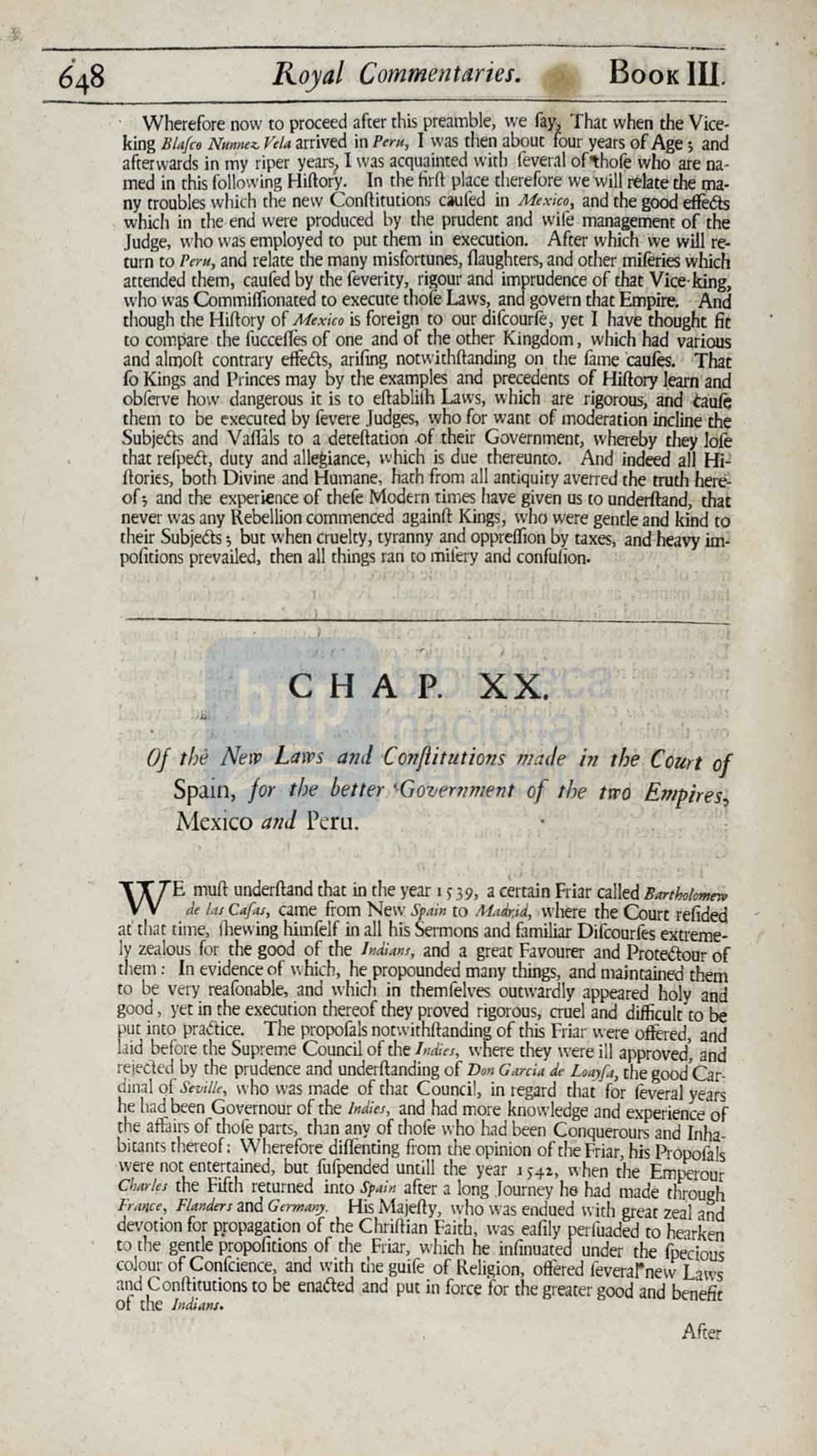

Royal
Commentaries.
BooK
III.
· Wherefore now
to
proceed afcer this preamble, we fay~ That when the Vice–
king
Blafco Nun_nez:. Vela
arrived in
Peru,
I ~as the~ about tour years
0f
A,ge ; and
afterwards in my riper years
1
I
was acquamted w1th [everal of~h?(e who are na–
med in rhis following Hiíl:ory.
In
the fuíl: place .cherefore wew11l relace the !;Ila–
ny croubles .which che new Coníl:icutions caufed in
Mexico,
and rhe godd
:effeéts
, which in che end were produced by che prudent aod wiíe management of che
Judge, who was employed
to
put them in execution. After which ·we
will
re–
turn
to
Pcru,
and relate che many misfortunes, flaughters, and other ínifeties which
actended chem, caufed by che feverity, i:igour and imprudence of thac Vice·king,
.who was Commiflionated to execute thof0Laws, and,govem thac
Ernpire:
And
chough che Hiíl:ory of
Mexico
is foreign
to
our difcourfe, yet
I
hav~ chought
fic
to
compare che fücceffes of one and of che other Kíngdom, which had various
and almoíl: contrary effeéts, arifing notwithíl:anding on che fame
·caufes.
Thac
fo
Kings and Princes may by che examples and precedencs of Hiílory l.eat:n'and
obíerve how dangerous
ic
is to eíl:abliíh 1=,aws, which are rigorou~· and
11
,caufe
chem
to
be executed by [evere Judges, who for wanc of moderacion indine;the
Subjeéts and Vaífals
to
a -deceíl:ation
.of
their Governmenr, whereby they.lofe
that reípeét, duty and allegiance, which is due thereunc@. And indeed ali.
HP
íl:orie:s, both Divine and Humane, hath from ali antiquicy averred che truth -here–
of; and the experience of thefe Modero times have given us co underíl:and, that
never was any Rebellion commenced :igainíl: Kings, who were gentle and kind to
their Subjeéts; but when cruelcy, tyranny and oppreflion by taxes; anaheavy
im–
poíicions prevailed, then
ali
chings ran
to
mifery and confufion.
CH A P.
XX.
Of thé New Lcnvs
and ·Confiitutions
made m the Court
of
Spain,
for the better tGovemment of the two Empires
Mexico
a11d
Peru.
)
W
E
muíl: underíl:and chat in che year
1
5
39
, a c~L'.taia Friar called
Bartholomew
de
la1 Cafa1,
carne from New
S¡ain
ro
Madr.id,,where the
Courc
refided
ac' that time, fhewing himfelf in ali his Sermon
s and familiar Difcourfes extreme–
Jy zealous for che good of che
lndiam,
and a great Favourer and Proteétour of
chem
:
In
evidence
of
which, he propounded rnany chings, and mainraint'd them
to
be very reaíonable, and which in themíelves outward\y appeared holy and
good, yec in the execution thereof they proved rigorous, cruel and difficulc to
be
pucinco praétice. The propofals notwichíl:anding of chis Friar were offered, and
la~d before che Supreme Council of che
! ndie1,
where they were
ill
approved, and
re¡ec1ed by che prudence and underíl:andmg of
Don G,1rcia de Loayfa,
the good Car–
dinal of
Seville,
who was made of chac Council, in regard that for feveral yéats
he bad been Governour of the
Jndies,
and had more knowledge and experience of
the affairs of chofe parts, thJn any of chofe who had been Conquerours and Inha–
bitanrsrhereof: ~herefore diífenting fr~m the opinion of rhe Friar, his Propofals
were noc encertamed, bue fuípended uncill the year
1541.,
when che Emperour
Charle1
che Fifch recurned inco
~pain
~fter a long Journey he had rnade chi;ough
France, Flanders
and
Germany.
H1s Maieíl:y, who was endued wich grear zeal and
devotion for propagacion of che Chtifrian Faitb, was eafily perfuaded to hearken
to che genrle propoficions of che Friar, which he ,infinuated under che fpecious
colour of Confcience, and wich the guiíe of Religion, offered feverarnew Laws
and Coníl:icucions to be enaél:ed and put in force
for
the greater good and benefit
of the
Indians,
Afrer














